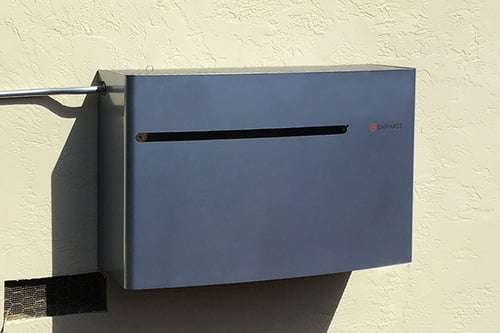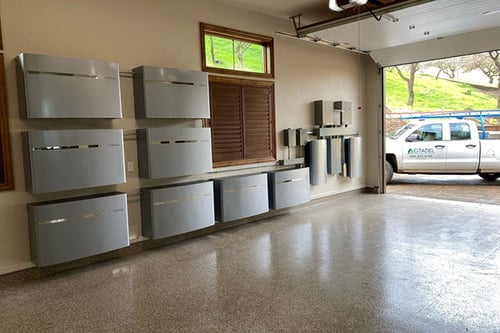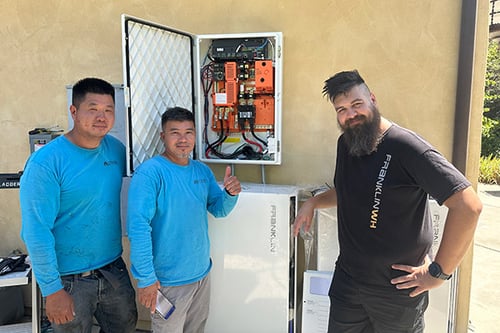What are home solar batteries?
Home solar batteries, also called “solar energy storage systems,” are devices that store excess energy generated by solar panels during the day for later use. This energy can then be used during periods of low sunlight, such as in the evening.
They work by storing electricity in rechargeable batteries, allowing homeowners to harness and utilize solar power even when the sun isn't shining. They enable greater energy independence by reducing reliance on expensive electricity from the power grid. Plus, they keep homes and businesses powered even during outages.
In this blog post, we’ll explore:
- How long home solar batteries typically last
- What impacts a home solar battery’s lifespan
- Warranty lengths for popular batteries
- How to decide if a home solar battery is right for you
How long do home solar batteries last?
 Most home solar batteries include a 10- to 15-year warranty, so you can reasonably expect them to last that long or a bit longer. But lifespan is impacted by the technology used, how frequently the battery is drawn upon, and the surrounding climate.
Most home solar batteries include a 10- to 15-year warranty, so you can reasonably expect them to last that long or a bit longer. But lifespan is impacted by the technology used, how frequently the battery is drawn upon, and the surrounding climate.
Those who like to hedge their bets estimate battery life at a broader range of 5 to 15 years since usage greatly affects how long a battery lasts. It's important to note that, unlike many products, battery life is measured in cycles as well as years, which we will explain below.
Regardless of your battery’s exact lifespan, it’s realistic to expect you will need to replace your battery system before your solar panels. Solar panels typically include a 25-year warranty.
At the end of its useful life, the system won’t stop working completely. But it will not provide a strong enough charge to do its job. Similar to how an aging tablet or smartphone will take a longer time to charge or never seem to charge fully, home solar batteries also eventually decline.
Let’s explore the factors impacting battery life.
The solar battery you choose impacts its lifespan.
Different batteries have different life expectancies, so the brand you choose impacts how long your battery will last. We’ll address the battery lifespans of leading brands later in this article.
Many residential batteries installed in the U.S. today, like the Tesla Powerwall, are lithium-ion. Others, like the Enphase IQ battery and Franklin WH battery, use a slightly different chemistry: Lithium iron phosphate, also known as LFP. Both chemistry types are known for their long lifespan and are also used to power electric vehicles.
How much you use your solar battery impacts its lifespan.
 Battery life is measured in cycles as well as years. Each draining and recharging of the battery constitutes a cycle. After a certain number of cycles, battery performance will begin to gradually diminish.
Battery life is measured in cycles as well as years. Each draining and recharging of the battery constitutes a cycle. After a certain number of cycles, battery performance will begin to gradually diminish.
Many solar battery systems are scheduled to cycle daily. How quickly your battery completes a cycle depends on your energy needs, the size of your battery system, and the system settings. A professional solar battery installer will ensure that your storagesystem is sized appropriately for your needs. This will help optimize system performance.
Like all batteries (similar to your phone and flashlight), the older they get and the more cycles they’ve completed, the less they can hold a charge and power your device. Eventually, they stop functioning at a useful level.
This is why some battery warranties list a maximum number of cycles allowed.
The surrounding climate and temperature impact your solar battery’s lifespan.
Like most batteries, the lithium-ion batteries and lithium iron phosphate batteries in solar energy storage systems are negatively impacted by extremely hot and extremely cold temperatures. Highs and lows can reduce performance and the battery’s lifespan.
Here in California, our customers generally reside in climates that are well within the optimal temperature range for home solar batteries. Whether we install the batteries in our customer’s home, business, garage, or yard, our state’s relatively moderate climate helps to protect their solar batteries’ lifespan.
Regardless of where you reside, the more controlled the environment and the milder the temperature swings, the better it is for your battery. That’s why Citadel generally does not install batteries on a home’s south side, which receives direct exposure to the sun.
In California’s colder regions, we install home solar batteries indoors to help ensure optimal performance.
It’s also important to note that some cities now have regulations about where on your property home solar batteries can be installed.
Solar battery warranty lengths and lifespans by brand
The manufacturers’ warranties give you a sense of what those companies believe is their battery’s lifespan. Companies typically warrant for slightly less than how long they think the system will last so that they are no longer responsible for old systems that have outlived their best years.
Solar battery warranties are more complex than solar panel and inverter warranties because they are affected so much more by how they are used. Most warranties cover a set number of years or a set number of cycles—whichever comes first. This is similar to some car warranties, which are measured in years or miles—whichever comes first.
Below are the battery warranties for the leading brands, in terms of years and cycles—the two most common measurements. Many warranties have temperature stipulations and other qualifiers. Some include a cap for total energy run through the battery (“throughput”) instead of or in addition to years and cycles.
So be sure to discuss the warranty with your solar company, and to read the fine print before signing on with an installer.
Tesla Powerwall Warranty Length
Tesla guarantees that its Powerwall 3 will retain at least 70% of its capacity for 10 years, with no limit on the number of cycles.
Franklin WH Battery Warranty Length
Franklin guarantees that its WH battery will maintain at least 70% of its capacity for 12 years, 6,000 cycles, or 43 MWh throughput—whichever comes first.
Enphase IQ Battery Warranty Length
Enphase guarantees that its IQ Battery 5P will retain at least 60% of its storage capacity for 15 years or after it completes 6,000 cycles—whichever comes first.
LG Chem Battery Warranty Length
LG guarantees its LG Chem battery will retain at least 60% of its capacity for 10 years.
SolarEdge Battery Warranty Length
SolarEdge batteries are warrantied to perform at 70% capacity for 10 years, with no limit on the number of cycles.
Sonnen Battery Warranty Length
Sonnen guarantees its SonnenCore battery for 10 years or 10,000 cycles, whichever comes first.
Are solar batteries worth it for you?
Whether or not a solar battery will deliver enough value for your home or business depends on a number of considerations that you can discuss with your family and a professional solar installer.
A solar energy system alone is a major investment that can offer major payback. Adding energy storage or batteries to your solar system can greatly increase the payback of that investment. So, is adding a battery to your solar energy system worth the additional investment?
Aspects that impact how much value you would reap from a solar battery include:
-
Roof Size: Very small roofs may not accommodate enough solar panels to charge a battery after household usage is met.
-
Need for Emergency Backup: Having power during a utility outage, planned or unplanned, is more important for some people than others. If constant electricity is critical to you, solar batteries can literally be a life-saver.
-
Time-of-Use Rates: Large California utility companies all offer billing plans that increase rates during peak usage times, such as in the late afternoon and evening. Solar energy storage empowers ratepayers to instead use their own affordable stored solar power rather than pay the utility’s pricey peak rate.
-
Incentives: Government programs can reduce the price tag of your battery investment. Many Americans who purchase solar energy storage are eligible for the federal Investment Tax Credit that pays you back up to 30% of the cost of installing a solar energy system.
In addition, many Californians qualify for the Self Generation Incentive Program (SGIP), which offers rebates for solar energy storage purchases and installation. As of December 2023, we at Citadel have secured over $5.2 million in SGIP rebates for our solar battery customers and look forward to securing even more while program funds last.
-
Independence from Expensive Utility Companies: For some, gaining increased independence from their utility company (and its ever-increasing rates) is a major motivator for installing solar batteries. They want to capture and use as much of their solar as possible, rather than send any extra electricity into the utility grid.
 Work with the experts at Citadel Roofing & Solar
Work with the experts at Citadel Roofing & Solar
Solar battery technology is relatively straightforward, but choosing the right solar battery, designing and configuring your system, and navigating rebate programs can be complex. However, experienced and qualified installers can make things clear and simple.
Whether or not you already have solar panels, contact Citadel to find out if solar energy storage is the right investment for you. Our all-in-house sales and installation team will be happy to help you on your journey to cleaner, reliable, and affordable solar energy.
Request a free solar battery quote now:



